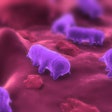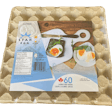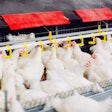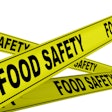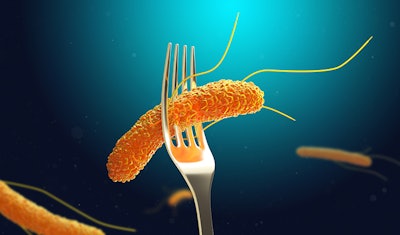
Salmonella will be classified as an adulterant in certain types of breaded and stuffed raw chicken products, the U.S. Department of Agriculture’s (USDA) Food Safety and Inspection Service (FSIS) announced.
“Today’s announcement is an important moment in U.S. food safety because we are declaring Salmonella an adulterant in a raw poultry product,” said Sandra Eskin, USDA Deputy Under Secretary for Food Safety. “This is just the beginning of our efforts to improve public health.”
The action ensures that highly contaminated products are not sold to consumers.
“Food safety is at the heart of everything FSIS does,” said Agriculture Secretary Tom Vilsack. “That mission will guide us as this important first step launches a broader initiative to reduce Salmonella illnesses associated with poultry in the U.S.”
Frozen breaded and stuffed raw chicken products, such as chicken cordon bleu, appear cooked, but contain raw poultry, and have been associated with up to 14 outbreaks and approximately 200 illnesses since 1998. Previous efforts to improve the clarity of product labels have not helped reduce the incidence of foodborne illness, the agency said.
According to the FSIS press release, breaded and stuffed raw chicken products will be considered adulterated when they exceed the limit of one colony forming unit (CFU) of Salmonella per gram.
The action follows previously announced efforts to reduce Salmonella associated with poultry products, with a focus on “encouraging preharvest controls to reduce Salmonella contamination coming into the slaughterhouse.”
A public comment period will open this fall on the FSIS Federal Register & Rulemaking page this fall.
Industry responds
The National Chicken Council (NCC) released the following response to the announcement:
“As these products often appear ready to eat, but contain raw chicken, we recognize their nature raises special considerations that merit additional attention. The National Chicken Council (NCC) and our member companies have invested millions of dollars and have worked for more than a decade to develop and refine best practices for these products to reduce Salmonella and protect public health. These efforts have been paying off, demonstrated by a significant decline in illness over the past seven years.
“NCC is concerned about the precedent set by this abrupt shift in longstanding policy, made without supporting data, for a product category that has only been associated with one outbreak since 2015. It has the potential to shutter processing plants, cost jobs, and take safe food and convenient products off shelves. We’re equally concerned that this announcement was not science-based or data-driven.
“Going back to the passage of the Poultry Products Inspection Act in 1957, the mere presence of Salmonella has not rendered raw poultry adulterated. We believe FSIS already has the regulatory and public health tools to work with the industry to ensure the continued safety of these products. We’ve been asking the agency for years to collaborate on these efforts, including two petitions for stricter regulations, requests that have gone largely ignored.
“There is no silver bullet or one-size-fits all approach to food safety, which is why we employ a multi-stage strategy. The only way to ensure our food is safe 100 percent of the time is by following science-based procedures when raising and processing chicken, and by handling and cooking it properly at home.
“NCC remains confident these products can be prepared and consumed safely, and the industry remains committed to continuing their efforts to further enhance the safety of these products.”












